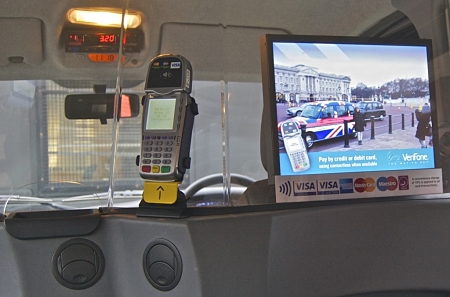After being all but gutted by ride hail giants Uber and Lyft in a number of markets, the taxi cab industry is fighting back fire with fire – using technology and apps to attempt to regain control of the industry.

Earlier this year, Verifone launched its Curb taxi-hailing app that was the first to introduce advance booking for traditional, licensed taxi rides in New York. Using Curb to book a cab is as simple as: opening the app, setting the pick-up location, and selecting to hail a cab for now or reserve one for later that day, tomorrow or beyond – all with no surge pricing.
"The yellow cab, an iconic symbol of New York, is leading the way," said Amos Tamam, senior vice president, Global Taxi Systems for Verifone. "Advance booking is the first of many new functions and technologies we’re launching with the Curb app, improving service to the public, and attracting passengers to the benefits of traditional, licensed taxis."
"Verifone’s rollout of Curb in New York City was a major step forward in leveling the playing field between taxis and Uber by expanding yellow and green service for all New Yorkers in all boroughs, and ensuring consumers never get ‘surge priced.’ This is a win-win for passengers and the taxicab industry," said Matthew W. Daus, former NYC Taxi & Limousine Commissioner.
Curb comes on the heels of Verifone’s 2015 launch of Way2ride, which was the company’s first ride-hail app. By integrating with Verifone’s in-taxi platform, Curb can connect to more than 300 taxi companies and 60,000 cabs nationwide. Consumers across the U.S. have already downloaded Curb more than 4 million times.
“Curb is the best option for passengers who want the convenience of e-hail, but also want the safety and predictable pricing of traditional licensed taxis,” said Tamam. “It’s also the first app with an advance booking feature for cabs, available today in most major markets, including New York City, Chicago and Los Angeles.”
Verifone powers more than 120,000 cabs in more than 160 cities across the globe with secure payments, cloud-based dispatch systems and fleet management tools, mobile apps and digital media.
“I like to say that we provide what Uber says it provides,” said Jason Gross, global head of product and marketing at Verifone. “We are a technology platform for the owners and operators of taxis to be connected with passengers who want transportation.”
In September, Flywheel, the app that makes taxis act like Uber, announced it is coming to New York City.
Flywheel's new operating system, TaxiOS, replaces taxi meters with a single smartphone. The technology was recently approved by New York City regulators for use in the city’s iconic yellow taxis.
Flywheel offers two main products: an e-hail app for riders, and a smartphone-based operating system for taxi drivers that replaces the jumble of meters, dispatch, advertising, navigation systems, and credit card readers currently clogging the interior of the vehicle.
Flywheel says it hopes to have its smartphone meter in 1,000 cabs by the end of 2016, and to dominate all 13,000-plus yellow taxis by the end of 2017.
“We’re finally giving these guys... a weapon to fight back against Uber,” said Oneal Bhambani, chief financial officer of Flywheel. “Now the drivers can operate with just a smartphone.”
The company, which is primarily an e-hail service, currently operates in San Francisco, Los Angeles, Seattle, San Diego, Sacramento and Portland. New York City, which is the country's largest taxi market, was the logical next step.
“The secret sauce in this industry, make no mistake about it, is the app you give to the driver,” he said. “The consumer facing app needs to talk to the driver app. That’s where the magic happens. That’s how you get fast ETAs.”
